Elections in Turkey Next Year May Bring the Erdogan Era to an End[Over]  By Benyamin POGHOSYAN, PhD, Chairman, Center for Political and Economic Strategic Studies By Benyamin POGHOSYAN, PhD, Chairman, Center for Political and Economic Strategic Studies
2023 will be a crucial elections year in Turkey, and there is no certainty that president Erdogan and his AK Party can maintain their hold on power. The stakes are high and political turmoil will have implications way beyond Turkey itself.
The latest Russia-US and Russia-NATO tensions have entirely shifted the attention of the media and the expert community to Ukraine. Tens, if not hundreds, of papers and policy briefs are published daily, seeking to understand what Russia wants in Ukraine and whether Russia and the West will come to a diplomatic solution and avoid war. As a NATO member and Black Sea littoral state Turkey has a significant role in these calculations. What will be Turkey's reaction if war breaks out in or around Ukraine, and how will the war impact Russia - Turkey relations in other regions – the Middle East, South Caucasus, Balkans, and North Africa? READ MORE
New Horizons of Cooperation Between Uzbekistan and the European Union[Over] 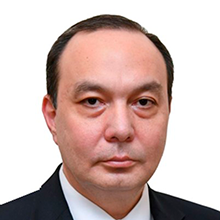 By Eldor Aripov, Director of the Institute for Strategic and Interregional Studies under the President of the Republic of Uzbekistan By Eldor Aripov, Director of the Institute for Strategic and Interregional Studies under the President of the Republic of Uzbekistan
Uzbekistan is on the eve of an important political event - the presidential elections in the country. This major political event was launched at the meeting of the Central Election Commission of the Republic of Uzbekistan, which took place on July 23, 2021. Today, the election campaign is in full swing, and it is taking place in a new political atmosphere. All processes are conducted openly, transparently and in accordance with the national electoral legislation and the time frames specified therein. All five parties that have nominated their candidates are actively promoting their program ideas and platforms. READ MORE
"Summit of Democracy" Puts Smaller States in a Complicated Situation[Over]  By Benyamin Poghosyan, PhD, Chairman, Center for Political and Economic Strategic Studies By Benyamin Poghosyan, PhD, Chairman, Center for Political and Economic Strategic Studies
Regardless of the intentions of the US and the future trajectory of the new world order transformation, the democracy vs. authoritarianism vision puts small states located between Russia and Europe in a complicated situation.
As the "Unipolar Moment" started to fade away after the 2008 world financial crisis, political elites, the expert community, and academicians in the different capitals of the world launched discussions and debates about the future of the world order. There was no lack of catchy terms – post-American world, multi-polar world, no polar world, polycentric world, the rise of others – which all have one common feature; there will be many players active on the geopolitical chessboard of the globe, and the US will not be able to impose its vision on all of them. The US political establishment coined its term for the emerging world order – great power competition – which is the prevailing theme in all strategic level documents published by the Trump and Biden administrations. READ MORE
- December 18, 2021 17:39PM
Is Iran making a comeback to the South Caucasus?[Over]  By Yeghia TASHJIAN, Beirut-based regional analyst and researcher, columnist, "The Armenian Weekly” By Yeghia TASHJIAN, Beirut-based regional analyst and researcher, columnist, "The Armenian Weekly”
Since the collapse of the Soviet Union 30 years ago, Iran has patiently and cautiously followed developments in the South Caucasus. Tehran’s main strategic objective has been to prevent US-Israeli penetration in the region, and it has viewed the Russian political and military presence in the region, particularly in Armenia, as a buffer zone against Western and even Turkish expansionist activities. When Turkey started to follow an independent foreign policy and came to terms with sharing power in the region with Russia, Iranian policymakers thought that Turkey—by cooperating with Russia—would reduce western influence in the region and give up its Pan-Turkic and neo-Ottoman claims. However, Iran was mistaken. READ MORE
- November 24, 2021 21:20PM
The War on Formats in the South Caucasus[Over]  By Benyamin Poghosyan, PhD, Chairman, Center for Political and Economic Strategic Studies, By Benyamin Poghosyan, PhD, Chairman, Center for Political and Economic Strategic Studies,
On November 10, 2021, the South Caucasus will mark the first anniversary of the tripartite Russia – Armenia – Azerbaijan statement, which ended the 2020 Karabakh war. During the last year, the experts, representatives of civil society, and journalists hotly debated the outcomes of the war and the implications of the trilateral statement. Who benefited more from the war – Russia, Turkey, or Azerbaijan? Has the Karabakh conflict been solved or thrown into the dustbin of history, or will the region face new rounds of negotiations and the possible resumption of hostilities? What is the future of Armenia – Azerbaijan and Armenia – Turkey relations? There are no easy answers to all these questions. However, one thing is clear – a year after the 2020 Karabakh war, the South Caucasus is still in the midst of geopolitical transformation, with regional powers vying for influence. READ MORE
- November 24, 2021 06:33AM
The debate about the “Corridors War” is not based on reality[Over]  By Benyamin Poghosyan, PhD, Chairman, Center for Political and Economic Strategic Studies By Benyamin Poghosyan, PhD, Chairman, Center for Political and Economic Strategic Studies
The "corridors war", currently being hotly debated among experts, pundits, and policy-making circles in the South Caucasus, is largely based on wishful thinking rather than hard facts. In reality the options are rather limited.
Since the end of the 2020 Karabakh war, the theme of competing corridors in the South Caucasus has established itself as one of the primary topics for discussion and debate among experts, pundits, and policymaking circles. Almost daily, Azerbaijan and Turkey speak about the necessity to open the so-called "Zangezur corridor," arguing that it will significantly boost the regional economy. According to Baku and Ankara, the opening of the corridor is envisaged under the terms of the November 10, 2020, trilateral statement, even though the document itself speaks about only one corridor – Lachin. Under the term “corridor”, Azerbaijan envisages an arrangement which will allow Azerbaijani vehicles and trains to cross the Armenia – Azerbaijan border, pass via the Syunik province of Armenia and then enter the Nakhijevan Autonomous Republic (an Azerbaijani exclave), without any border, passport, and customs control implemented by the Armenian side. READ MORE
- November 16, 2021 12:54PM
Georgia’s Mediation Moment[Over]  By Benyamin POGHOSYAN, PhD, Chairman, Center for Political and Economic Strategic Studies By Benyamin POGHOSYAN, PhD, Chairman, Center for Political and Economic Strategic Studies
Whilst Georgia has long acted as an informal home for peace building initiatives between Armenia and Azerbaijan, its recent offer of its “good offices” shows a higher level of engagement.
Ever since the end of the first Karabakh war, Georgia has become a Mecca for meetings of Armenian and Azerbaijani experts, peacebuilders, and other civil society representatives. Buzz words such as Track 2 and Track 1.5 diplomacy in the context of the Karabakh conflict settlement process could be heard very often in hotel conference halls and board rooms in Tbilisi, Bakuriani, Telavi, and other places. Given the apparent obstacles in bringing Azerbaijani experts to Armenia and Armenians to Azerbaijan, many saw Georgia as an ideal place for serious meetings and discussions and long Caucasian-style dinners. READ MORE
The Great Game in the Levant: Russia’s Interests in Lebanon[Over]  By Yeghia TASHJIAN, Beirut-based regional analyst and researcher, columnist, "The Armenian Weekly” By Yeghia TASHJIAN, Beirut-based regional analyst and researcher, columnist, "The Armenian Weekly”
Like other regional powers, Russia has taken major steps to advance its geopolitical interests in the Levant. With the goals of expanding its influence and control the vast energy resources in the region. Although it only has a naval military base in Tartus (Syria) and no borders on the Mediterranean Sea, Russia has managed to exert its influence around nearby countries, including Lebanon. The perception of Lebanon as part of its Syrian stake encourages Moscow to strive to capitalize on its influence in the region after intervening in the Syrian conflict. In the last few years, Russia started playing a larger role in Lebanon following the growing civil unrest in Syria and the defeat of ISIS. READ MORE
Turkey Takes Advantage from Crimean Platform to Enhance Its Leverage against Russia[Over] 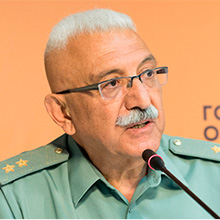 By Hayk KOTANJIAN, Lieutenant General (ret), Professor of RA, RF, USA (strategic security studies), Lazarev Club Board Member By Hayk KOTANJIAN, Lieutenant General (ret), Professor of RA, RF, USA (strategic security studies), Lazarev Club Board Member
On the eve of the 30th anniversary of Ukraine, on August 23, 2021, at the initiative of President of Ukraine Zelensky, the Crimean Platform summit was held with the participation of 46 states and international organizations. The establishment of the platform with the goal of its long-term functioning was announced as one of the main events in the framework of the celebration of the 30th anniversary of independence of Ukraine. According to the President of Ukraine Vladimir Zelensky, the launch of the platform will introduce the problem of "de-occupation of the Crimea" into the international agenda on a regular political and diplomatic basis. READ MORE
The Architecture of an Innovative Strategic Union Russia-Armenia[Over]  Hayk Kotanjian, Lieutenant General (ret), Professor of RA, RF, USA (strategic security studies), Lazarev Club Board Member Hayk Kotanjian, Lieutenant General (ret), Professor of RA, RF, USA (strategic security studies), Lazarev Club Board Member
The strategic emphasis of the 4th session of the Lazarev Club has been imperatively demanded by the need to find and pursue new ways to prevent the loss of the Armenian national statehood. The end-product of those efforts should be built upon the coincidence of the strategic interests of security and sustainable development of our two fraternal peoples and allied states - Russia and Armenia. The existential importance of brainstorming on the problem of life and death of the state, as well as its innovative development, was exacerbated by the challenge of the upcoming formation of new authorities following the results of the early parliamentary elections. READ MORE
- September 4, 2021 06:08AM
Armenian Foreign Policy in the Context of the Transformation of Global Order[Over] 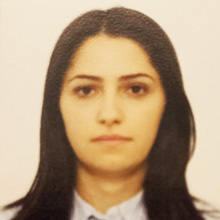 By Lilit Galstyan, Senior Research Fellow, Academy of Political Studies, Yerevan By Lilit Galstyan, Senior Research Fellow, Academy of Political Studies, Yerevan
The end of the Cold War and the collapse of the Soviet Union have ushered in hopes of humanity's happy and harmonious future. The ideas such as "End of history" became very popular both within academic circles and with policymakers. There was a widespread belief that the entire planet would live under liberal democracy, and inter-state conflicts will become bad memories from history. However, the beginning of the XXI century crushed these hopes. Russia - West relations started to deteriorate after the 2004 Orange Revolution in Ukraine, while the 2014 Crimean crisis brought bilateral relations to the lowest point since the end of the Cold War. Meanwhile, the astonishing Chinese economic growth and the emergence of the multi-million middle class did not bring about political changes in China. READ MORE
An Impressive EU Aid Package to Armenia Does not Solve Yerevan’s Dilemma on Karabakh[Over]  By Benyamin Poghosyan, PhD, Chairman, Center for Political and Economic Strategic Studies By Benyamin Poghosyan, PhD, Chairman, Center for Political and Economic Strategic Studies
The EU has thrown Armenia an economic lifeline, but Yerevan has a stark choice ahead: either to use its economic resources to modernise its military and ensure that the Armenian population left in Karabakh is protected, or to create conditions for the Armenians in Karabakh to gradually settle in Armenia.
The EU has always perceived the South Caucasus as a neighbouring area between Europe, the Middle East, and Central Asia. The South Caucasus was never part of the EU's vital interests, but the Europeans were not indifferent to the region's fate. After the collapse of the Soviet Union, the EU signed Partnership and Cooperation Agreements with South Caucasus Republics, and later included the region into the European Neighbourhood policy. The next phase in EU-South Caucasus relations was the launch of the Eastern Partnership initiative and the inclusion of Armenia, Azerbaijan, and Georgia into the program. READ MORE
To Open Transport Links in the South Caucasus, Azerbaijan Needs to Avoid the term “Zangezur Corridor”[Over]  By Benyamin Poghosyan, PhD, Chairman, Center for Political and Economic Strategic Studies By Benyamin Poghosyan, PhD, Chairman, Center for Political and Economic Strategic Studies
Armenia always supported the idea of restoring communications and developing economic relations with Azerbaijan as a tangible way of confidence building. However Azerbaijan has to give up its inflammatory and disruptive rhetoric about the "Zangezur Corridor", and its thinly veiled threats to take over the Syunik province from Armenia.
The 10 November 2020 tripartite statement signed by Armenia, Azerbaijan and Russia ended the war in Nagorno Karabakh, but evidently, did not bring peace to the region. A range of complex issues remain to be settled – the future of Nagorno Karabakh, relations between Armenia and Azerbaijan, and the security dynamics of the broader region. Given the Russian military presence in Karabakh, the region's future now mostly depends on the Kremlin, and neither Armenia nor Azerbaijan has much room for manoeuvre here. The status of Karabakh will remain a topic in bilateral Russia–Azerbaijan and Russia–Armenia discussions, but Moscow will do whatever it thinks it is necessary to do. READ MORE
Russia-Turkey Relations after the Karabakh War: A View from Armenia[Over]  By Benyamin Poghosyan, PhD, Chairman, Center for Political and Economic Strategic Studies By Benyamin Poghosyan, PhD, Chairman, Center for Political and Economic Strategic Studies
Russia – Turkey relations are probably among the most discussed topics of Eurasian geopolitics. Experts and pundits are frantically searching for the correct terms to describe them – cooperation/competition, the marriage of convenience, and frenemies – all these words are used in endless efforts to grasp reality beneath the surface of high-level meetings and smiley handshakes of the leaders. The two countries interact in different regions – Middle East, Northern Africa, Black Sea basin, Central Asia, Western Balkans, and South Caucasus. In all these areas, they have overlapping and colliding interests, which have created a complex web of relationships. READ MORE
Big Armenian Decisions on Future Relations with Azerbaijan[Over]  By Benyamin Poghosyan, PhD, Chairman, Center for Political and Economic Strategic Studies By Benyamin Poghosyan, PhD, Chairman, Center for Political and Economic Strategic Studies
Relations with Azerbaijan will be the key foreign policy issue faced by the new government, regardless of the outcome of the forthcoming parliamentary elections. Big decisions on future relations with Azerbaijan will have to be taken soon after the new Armenian government is formed after the 20 June elections.
On 10 May 2021, the Armenian Parliament did not elect a prime minister for the second time in a row. According to the Armenian constitution, Parliament was dissolved, and the President signed a decree to hold snap parliamentary elections on 20 June 2021. It is not easy to predict the precise results of the elections. However, we may assume that Armenia will not have a single-party government after the elections. READ MORE
Armenia’s Reformers Struggle On[Over]  By Armen Grigoryan, Vice-president, Yerevan-based Centre for Policy Studies By Armen Grigoryan, Vice-president, Yerevan-based Centre for Policy Studies
After last year’s war, hopes that the 2018 revolution will fulfil its promise are fading – but it’s not too late for change.
“A stellar performance in one year is no guarantee of future success,” declared The Economist after Armenia held free and fair elections three years ago. The qualified praise was not without cause. It was always likely that Armenia’s attempts at democratic consolidation would be difficult, particularly because of the need for some unpopular reforms. Prior to the December 2018 parliamentary elections, observers noted that civic demobilisation – the influx of non-profit sector professionals to the government and their ensuing unwillingness to criticise it – could potentially undermine political pluralism, enable re-emergent authoritarianism, or foster the rise of right-wing populism. READ MORE
How Baku Undermines the Credibility of Russia's Mediation Mission[Over] 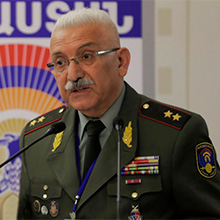 By Lieutenant General (R) Hayk Kotanjian, D.Sc, Full Professor (Strategic Security Studies) By Lieutenant General (R) Hayk Kotanjian, D.Sc, Full Professor (Strategic Security Studies)
Dear Colleagues, I have the honour to draw your attention to the deliberate steps taken by the Baku authorities to undermine the international community's confidence in Russia's mediation mission in the peaceful settlement of the Armenian-Azerbaijani relations and in the South Caucasus region. Another irrefutable evidence of this, among many facts, is the provocation of the Azerbaijani authorities with the violation of the Republic of Armenia’s state border regime, which defiantly followed right after the visit of Russian Foreign Minister Sergey Lavrov to Azerbaijan on May 10-11, 2021 and his departure from Baku. READ MORE
Polish-Romanian Defence and Security Policy[Over] 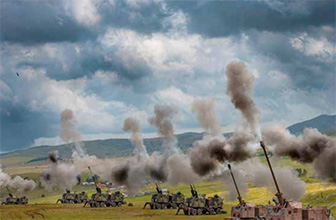 By Eugene Kogan, Tbilisi-based defence and security expert By Eugene Kogan, Tbilisi-based defence and security expert
A joint initiative of Romanian President Klaus Iohannis and Polish President Andrzej Duda, known as the ‘Bucharest Nine', was launched in November 2015 and laid a foundation for foreign and security policy meetings and discussions. As the next step, the Warsaw NATO Summit in July 2016 accelerated military-to-military cooperation. As a result, the initiative brought Romanian troops to Poland and Polish troops to Romania on a rotational basis in March 2017. In addition, their pivotal positions in the east and in the south of NATO’s reach have further increased their cooperation in a variety of defence and security programmes. READ MORE.
Russian-Turkish Relations: Moscow Calls the Tune[Over] 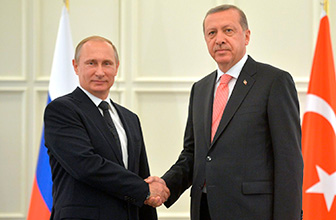 By Eugene Kogan, Tbilisi-based defence and security expert By Eugene Kogan, Tbilisi-based defence and security expert
The relationship between Russia and Turkey is an unequal one. Turkish President Recep Tayyip Erdoğan does not like playing second fiddle in the Russian-Turkish orchestra, conducted by Russian President Vladimir Putin. However, at every twist and turn, Putin holds more leverage over Erdogan than the other way around.
Putin will cooperate with Turkey as long as it suits Russian interests. He would quickly end the relationship if Turkey were to turn against him and tried to return to the Western fold from which it has drifted away ever since the failed coup on 15 July 2016. Erdoğan is aware of this and, as a result, is leading Turkey ever deeper into the Russian fold since the European Union, the United States and NATO all remain suspicious of him and his administration’s goals and are simply unwilling to assist him in his various military activities in Libya, Syria and, most recently, in the South Caucasus. READ MORE.
The EU Will Not Act as a Counterweight to Russia in Either Armenia or NKR[Over]  By Benyamin Poghosyan, PhD, Chairman, Center for Political and Economic Strategic Studies By Benyamin Poghosyan, PhD, Chairman, Center for Political and Economic Strategic Studies
The EU is neither willing nor capable of countering Russia or Turkey in Armenia and Azerbaijan and will not make efforts to decrease Russian influence in Armenia and the unrecognised Nagorno Karabakh Republic.
EU-Armenia relations entered a new phase in 2009 when the EU launched its Eastern Partnership Initiative. Armenia successfully negotiated an Association Agreement with the EU and was going to sign it in autumn 2013. The growing tensions between Russia and the West forced Armenia to cancel the signature, not to ruin relations with its strategic ally. Armenia and the EU started a new round of negotiations in late 2014, culminating with the signature of the Comprehensive and Enhanced Partnership Agreement (CEPA) in November 2017. READ MORE
The Realistic Policy of Armenia towards Nagorno-Karabakh[Over]  By Benyamin Poghosyan, PhD, Chairman, Center for Political and Economic Strategic Studies By Benyamin Poghosyan, PhD, Chairman, Center for Political and Economic Strategic Studies
The 2020 Karabakh war has dramatically changed the geopolitical status quo in the South Caucasus. Discussions have been underway in Armenia and the Armenian Diaspora about the reasons for the catastrophe and those responsible. Most probably, military defeat will be a key topic during the upcoming June 2021 snap parliamentary elections. The thorough analyses of what happened before, during, and after the war are mandatory tasks to be fulfilled. However, the key for Armenia now to elaborate a new policy towards the Karabakh conflict, taking into account the war results. The most significant issue here is to develop a realistic policy based on accurate calculations, Armenia’s resources, and the interests of external players; otherwise, Armenia may face another catastrophe. READ MORE
Beijing’s Long Road to the Gulf Region[Over]  By Fuad Shahbazov, Baku-based independent regional security and defence analyst By Fuad Shahbazov, Baku-based independent regional security and defence analyst
Energy cooperation has been a key aspect of growing bilateral cooperation between China and the Arab states of the Gulf region for the past several years. Since 1996, China has become a net importer of crude oil and, as the second‑largest energy consumer in the world after the United States, is now the third‑largest importer of oil after the United States and Japan. Therefore, it should not come as a surprise that China is eying a deep and strategic partnership with the states of a region that sits on top of the world’s largest proven crude oil and natural gas reserves. READ MORE
Searching for the Right Formula for South Caucasus Regional Co-operation[Over]  By Fuad Shahbazov, Baku-based independent regional security and defence analyst By Fuad Shahbazov, Baku-based independent regional security and defence analyst
President Erdogan’s initiative for a 3 + 3 regional co-operation format in the South Caucasus offers the possibility of opening up the region through an extensive network of land corridors. Not everyone has welcomed the initiative, but the prospect of turning a fragile region into a beacon of stability after a long period of instability and violence is a worthy aspiration.
The second Karabakh war has shifted the geopolitical and geo-economic realities in the South Caucasus region, particularly heightening the possibility of competition over the region’s transport corridors. The Moscow-brokered ceasefire agreement signed on 10 November brings with it the possibility of opening a number of transit routes, which have been closed for almost 30 years. In the aftermath of the Armenian forces' devastating defeat in the 44-day war, the idea of regional co-operation becomes increasingly important. READ MORE
Snap Parliamentary Elections are Unlikely to Resolve Armenia’s Political Gridlock[Over]  By Benyamin Poghosyan, PhD, Chairman, Center for Political and Economic Strategic Studies By Benyamin Poghosyan, PhD, Chairman, Center for Political and Economic Strategic Studies
Armenia appears heading for snap parliamentary elections on 20 June, but hopes that the poll may resolve the current gridlock in the Armenian political arena may be premature. For Armenia, things may get worse before they get better.
A tense political crisis has been ongoing in Armenia since immediately after the signing of the 10 November, 2020, trilateral statement on Nagorno Karabakh. That same night, angry protestors stormed the building of the Government and the Parliament, and the National Assembly's Speaker was physically attacked, resulting in him spending a month in the hospital. However, these actions did not lead to the resignation of Prime Minister Nikol Pashinyan. He took refuge in a Ministry of Defence bunker for a week, and there was no organised opposition that could take power while the Prime Minister was absent from the political scene. READ MORE
Why Azerbaijan Is Trying to Rekindle Israeli-Turkish Ties?[Over]  By Fuad Shahbazov, Baku-based independent regional security and defence analyst By Fuad Shahbazov, Baku-based independent regional security and defence analyst
The recent normalisation deals between Israel and the United Arab Emirates (UAE), Bahrain, Morocco, and Sudan signify substantial changes in the Middle East. The new agreements were signed following substantive negotiations on several security-related issues, including Iran and Turkey’s growing influence. However, unlike their Arab counterparts, both Ankara and Tehran denounced the Abraham Accords, labelling them as a betrayal of the Palestinian cause and a “dagger in the back of Muslims. Nevertheless, media reports in December 2020 revealed that Turkey and Israel had established a secret channel for negotiations to prepare a roadmap to further bilateral relations. READ MORE
|
|